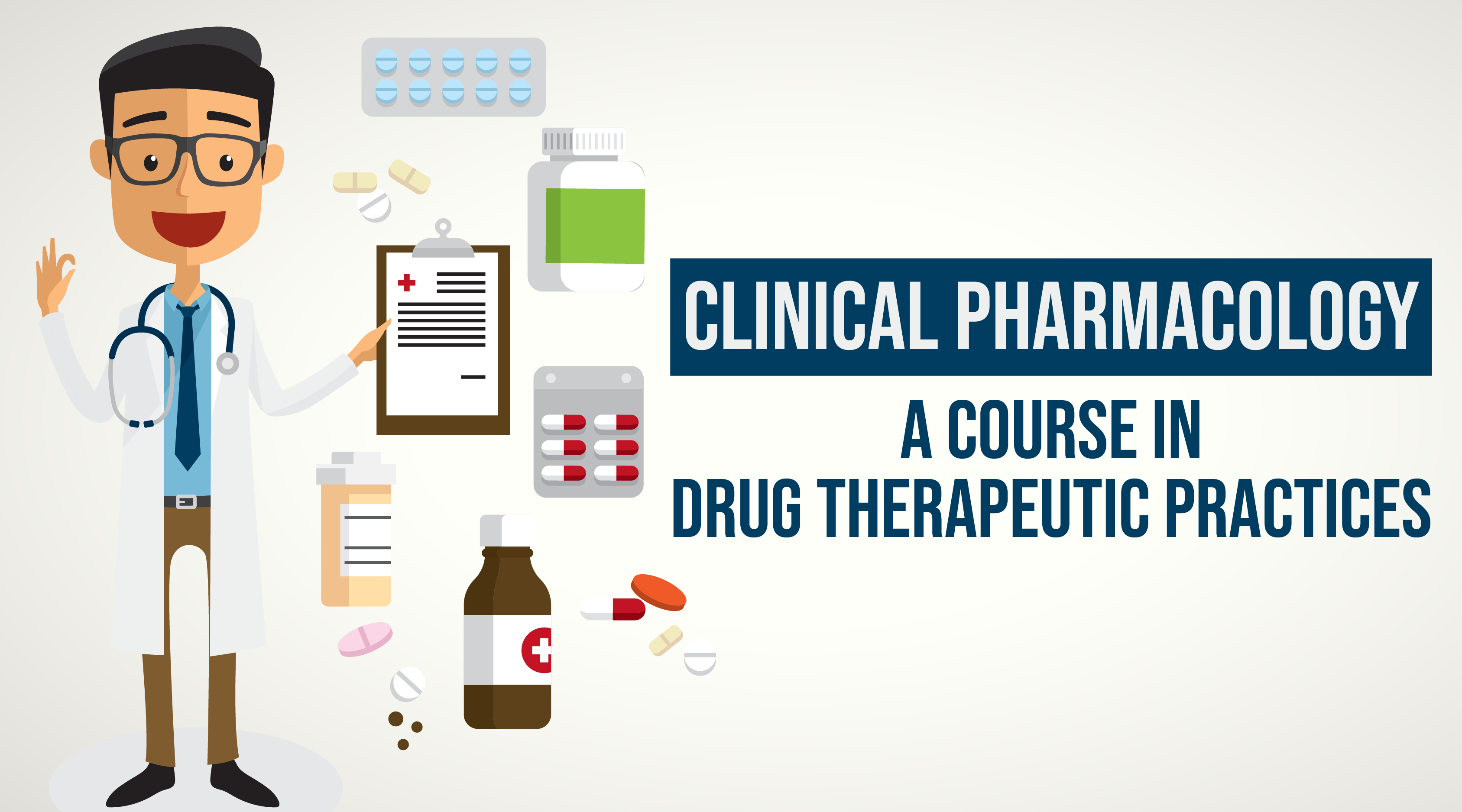Clinical Pharmacology is the study of different therapeutic practices and humans as a whole. It is an interconnected course that focuses on diverse principles and methods of individualization of drug therapy and its application. With this course, the students can get a broad scope of knowledge in the field of drug usage, medication safety, drug research, drug information, and their intended side effects. Clinical Pharmacology covers related topics like pharmacogenetics, drug use in the liver and renal diseases, drug in special populations, drug interactions, adverse drug reactions, and therapeutic drug monitoring.
What the course focuses on?
- Knowledge of medical safety standards
- Side effects of various drugs in humans
- Monitoring different types of drugs
- Different types of therapies for both genral and special population
- Skill in handling drug reactions
Clinical Pharmacology Books:
- Roach's Introductory Clinical Pharmacology
- Pharmacology for the Prehospital Professional
- Study Guide to Accompany Roach's Introductory Clinical Pharmacology
- Basic and Clinical Pharmacology 14th Edition
- Clinical Pharmacology and Therapeutics for Veterinary Technicians
- Introduction to Clinical Pharmacology
- Bioequivalence and Statistics in Clinical Pharmacology
- Oxford Textbook of Clinical Pharmacology and Drug Therapy
Clinical Pharmacology Pdf:
Highlights:
| Course Name | Clinical Pharmacology |
|---|---|
| Course Level | Postgraduate, Super Speciality Degree |
| Duration |
|
| Examination Type | Semester |
| Eligibility | Varies with course |
| Admission Process | Merit and Entrance based admission |
| Top Recruiters |
Government Hospitals, Private Hospitals, Health Cares, Research centres, Medical Health Centres, etc |
| Top Career Scopes | Professor/Lecturer/Assistant Professor, Chief Medical Officer, Clinical Leader, Clinical Pharmacologist, Clinical Research Associate, Direct Marketing Manager, Drug Inspector, Medical Writer, etc |
Top Colleges
Eligibility
| Course Name | Course Duration | Eligibility |
|---|---|---|
| M.D. in Clinical Pharmacology | 3 years |
|
| D.M in Clinical Pharmacology | 3 years |
|
Skills Required:
- Patience and politeness
- Ability to build a harmonious relationship with their patients
- Strong Ethics
- Service mentality
- Self-motivating
- Understanding the situations
- Good communication skills
Syllabus:
D.M. Clinical Pharmacology
| Basic principles of clinical pharmacology | |
|---|---|
| Introduction: The Clinical Pharmacology | Principles of Drug Therapy |
| Principles of drug actions; molecular mechanisms of drug action including | Drug usage in special clinical condition |
| Pharmacokinetics and Pharmacodynamic | Drug monitoring |
| Biostatistics | |
|---|---|
| Methodologies for drug development | Drug evaluation and Clinical trials |
| Systemic Clinical Pharmacology and Therapeutics and Recent Advances | |
| Pharmacodynamic Exercises | |
|---|---|
| Central Nervous System | Cardiovascular system |
| Respiratory system | |
| Pharmacokinetic Exercises | |
|---|---|
| Basic Pharmacodynamic Concepts | Theraputic Drug Monitoring |
| Difference between Pharmacokinetics and Clinical Pharmacokinetics. | |
M.D. Clinical Pharmacology
| Subject Name | Subject Name |
|---|---|
| Clinical and Basic Sciences as applied to Pharmacology | Central Nervous System |
| Autonomic Nervous System | Cardiovascular System |
| Hematopoietic System | Kidney/Renal System |
| Endocrinology Respiratory System | Gastrointestinal System |
| Microbial resistance | Regulation of cell growth and differentiation |
| General Pharmacology | Important landmarks in the growth and development of Pharmacology, important contributions of renowned Indian and foreign Pharmacologists |
| Principles and modes of drug administration, source, nature and preparations of drugs | Qualitative and Quantitative Pharmacokinetics |
| Pharmacodynamics | Drugs interactions, Adverse drug reactions |
| Methods of new drug development | Factors modifying drug response |
| Pharmacogenetics and pharmacogenomics | Structure-activity relationship of an important group of drugs |
| Preclinical evaluation of new drugs and toxicity studies | Systemic Pharmacology |
| Autonomic nervous system | Central nervous system |
| Cardiovascular system | Hematopoietic system |
| Respiratory system | Analgesic-Antipyretic |
| Anticonvulsant | Sedative-hypnotics |
| Anti-psychotic | Anti-depressant |
| Anti-parkinsonian | Anti-diabetic Autonomic |
| Anti-anginal | Anti-arrhythmic Hypotensive Diuretic Hypoglycaemic |
| Anti-inflammatory | Anti-secretory |
Admission Process
Admission into Clinical Pharmacology in most of the colleges is done on the basis of performance in the national entrance examination like NEET P.G, PGIMER. AIIMS, etc. Only the students who score above or equal to the cut-off will be eligible for the admission process. The merit list of students will be prepared according to the cut-off mark. Many institutions have a Group Discussion stage, yet many institutions directly invite students for the counselling process. However, some institutes carry out their own entrance exams followed by personal interviews and counseling in some cases.
Top Entrances
1. Postgraduate Institute of Medical Education & Research (PGIMER) Entrance Exam
- Mode of Exam: Offline
- Duration of Exam: 180 mins
- Type of questions: Multiple Choice Questions
2. National Eligibility cum Entrance Test for Postgraduate (NEET-PG)
- Minimum Qualification: Candidates must have an MBBS degree that should be recognized by the Medical Council of India.
- Exam Date: 5th January 2021
- Exam Mode: Online
3. All India Institute for Medical Science (AIIMS) Entrance Exam
- Minimum Qualification: The candidate needs to have an MBBS degree from any university recognized by the Medical Council of India or State Medical Councils.
- Exam Duration: 3 Hours
- Exam Mode: Online
4. Bharati Vidyapeeth University Common Entrance Test (BVP CET)
- Exam Type: National Level
- Exam Mode: Offline
- Exam Duration: 3 Hours
Career Scope:
A career in Clinical Pharmacology can provide a very lucrative future. With a degree in Cardiology, one may avail one of many high paying jobs like becoming a Chief Medical Officer or a Clinical Pharmacologist. In this field, one can also be a lecturer for any medical college. Here, are some of the top career/job profiles associated with the field.
| Job/Career Profile | Salary/Annum |
|---|---|
| Professor/Lecturer/Assistant Professor | Rs 5 - 10 lakhs |
| Chief Medical Officer | Rs 6 - 20 lakhs |
| Clinical Leader | Rs 4.80 - 7.75 Lakhs |
| Clinical Pharmacologist | Rs 5 - 20 lakhs |
| Clinical Research Associate | Rs 2.5 - 8 lakhs |
| Direct Marketing Manager | Rs 3 - 8 lakhs |
| Drug Inspector | Rs 4 - 12 lakhs |
| Medical Writer | Rs 3 - 10 lakhs |
Top Recruiters
- Government Hospitals
- Private Hospitals
- Health Cares
- Research centres
- Medical Health Centres
Top Hiring Cities:
- Delhi
- Mumbai
- Bangalore
- Hyderabad
- Kolkatta
FAQ's
Q: What are the top colleges providing a degree in Clinical Pharmacology?
A: Some of the top colleges are mentioned below:
- Madras Medical College
- Amity University Noida
- Institute of Medical Sciences and SUM Hospital
- Postgraduate Institute of Medical Education and Research
- Armed Forces Medical College
- Amrita Vishwa Vidyapeetham
Q: What is the eligibility criteria for a degree in Clinical Pharmacology?
A: The eligibility criteria are mentioned below:
- Candidates those who have M.D/D.N.B. in General Medicine or M.D/D.N.B. in Pediatrics or M.D/D.N.B. in Respiratory Medicine are eligible for this course.
- The applicants should have completed 10+2 with Biology, Chemistry, and Physics.
- One year internship is compulsory for the candidates. Moreover, the internship should be completed before the admission date.
Q: What are the Top Career Profiles associated with Clinical Pharmacology?
A: Some of the top career profiles are mentioned below:
- Clinical Leader
- Clinical Research Associate
- Drug Inspector
Q: What is the duration of a course in Clinical Pharmacology?
A: The duration of the course is 3 years
Q: What are the important skills required in this field?
A: The important skills are mentioned below:
- Patience and politeness
- Ability to build a harmonious relationship with their patients
- Strong Ethics
- Service mentality
Q: Who are the top recruiters in this field of Clinical Pharmacology?
A: Some of the top recruiters are mentioned below:
- Government Hospitals
- Private Hospitals
- Health Cares
- Research centres
- Medical Health Centres












